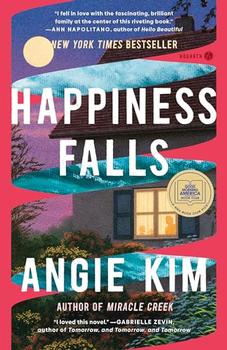Summary | Excerpt | Reading Guide | Reviews | Beyond the book | Read-Alikes | Genres & Themes | Author Bio

A Novel
by Angie KimFourteen-year-old Eugene shows up bloody and alone at his doorstep the evening his father disappears. His siblings, John and Mia, don't ask him any questions. The thought to do so doesn't cross the mind of Eugene's mother, Hannah, either. Detectives also ignore him, even though he allegedly was the last to see his father. Eugene has a rare genetic condition called Angelman syndrome, which renders him unable to communicate through speech. His family struggled for years to converse with him, and they have almost entirely resigned trying, as have others around him. Told from Mia's perspective, Angie Kim's Happiness Falls is a unique mystery where a missing father is just the beginning of a family really getting to know each other. It demands that readers take a look into their own preconceptions of people in their lives, both those they have interacted with regularly and those they don't know, including the more marginalized of society — this novel is about everyone being seen as multidimensional.
My favorite parts of Happiness Falls are the memories Mia recounts. They almost always include the whole family, and serve as a way for Kim to tell readers about characters' past and present selves — about how Mia and John almost telepathically communicate as children, about Eugene's feeling seen in his relationship with his grandmother, then about heartbreaking moments where he isn't seen at all. Each memory spotlights individuals while also characterizing everyone else involved.
Eugene's lack of vocalization informs every character's assumption that he is not worth intellectually interacting with. If only someone would try to communicate with him, they would be much closer to knowing what happened to his father. Kim articulates the complexity of this situation well and with grace.
As much as I loved Happiness Falls, some directive choices made it a little less enjoyable for me, including Mia as the first-person narrator. Though I usually prefer unlikeable characters, as Mia can be, she seems like the least interesting character in the novel and a vessel for the story, as opposed to a whole person. Even with her thoughts and meditations throughout the narrative, I couldn't really connect with and invest in her. I connected better with everyone else, no matter how little or much could be gleaned from their characters. To me, Mia felt more like a third-person limited speaker with a bit of a voice.
In fact, I felt the most emotionally invested in Eugene. Within all of Kim's wonderful writing, I was still left so curious about Eugene's personhood outside the context of his disability and familial relationships. Most of the characterization we get of Eugene is tied to his lack of speech, but he feels like such a core part of the novel that I wanted more of him.
That said, Happiness Falls is not only a great suspense novel where every page pulls you toward the edge of a horrific cliffhanger, it is also a novel that confronts you. It alerts you to the possibility of biases you might harbor in your own life. It wakes you up — both in the sense that you can't rest amid its intense mystery, and in how it demands you really see others for who they are, regardless of how they might look on the outside.
![]() This review was originally published in The BookBrowse Review in October 2023, and has been updated for the
June 2024 edition.
Click here to go to this issue.
This review was originally published in The BookBrowse Review in October 2023, and has been updated for the
June 2024 edition.
Click here to go to this issue.

If you liked Happiness Falls, try these:

by Cynthia Weiner
Published 2025
A dazzling novel about one young woman's summer of infinite possibility...

by Lindsay Hunter
Published 2024
The third title in Roxane Gay Books' inaugural list, Hot Springs Drive is an urgent, vicious blade of a novel about a shocking betrayal and its aftermath, asking just how far you'll go to have everything you want
Your guide toexceptional books
BookBrowse seeks out and recommends the best in contemporary fiction and nonfiction—books that not only engage and entertain but also deepen our understanding of ourselves and the world around us.